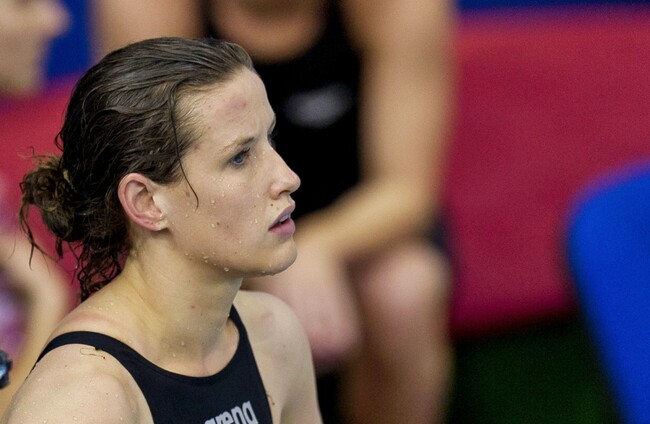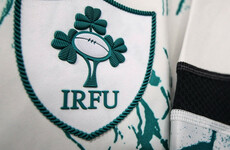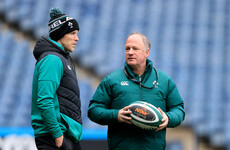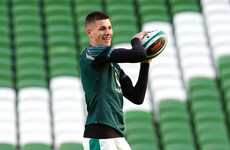“MY OLYMPIC JOURNEY was amazing, but painful as well,” Melanie Nocher says, adding: “I was very young, I was only 20.”
It’s over a decade since the Down native first competed at the Olympic Games — 2008 in Beijing to be precise.
She is clearly in a far different place now, as indicated by the baby that occasionally interrupts our conversation and the new house she has just moved into.
Having spent years dealing with the rigours of competitive swimming though, getting to this place in her life has been far from straightforward.
Nocher enjoyed a distinguished career in swimming, representing Ireland both in Beijing 2008 and London 2012.
China went pretty well for the youngster, despite the painful scenario of her goggles falling off while competing in the 200m freestyle. She set an Irish senior record in the the 200m backstroke and was pleased with her overall performance.
Those results left her feeling positive and she opted to move to full-time training thereafter in preparation for London 2012. Her second Olympics, however, did not go as planned.
The training camp was really good,” she recalls. “I was feeling the leanest and best I’d ever been. Then, whenever I went into the village, I picked up a virus. I lost about 5k in two days from being sick and having a stomach infection, just from the amount of people that were there. That was soul-destroying.
“I didn’t want to not give myself the opportunity to at least try. But the problem with that is when you don’t have a physical injury like a broken leg or a broken arm and you come out and you don’t swim as well as you want, it came across as ‘oh she’s nervous’. It’s easy to say you’ve got gastroenteritis or whatever. For me, it would have been easier breaking my leg, because people could physically see it.
“That was really painful, and still is if I’m perfectly honest. I don’t think I’ll ever get over it. Because you were set up so well for it. But that is life. Whenever you step away from it, it didn’t go the way I wanted it to, but I’ve learned so much from it.
“I asked myself the question if it happened again in 2016, how would I react? It wouldn’t have been positive. So I made the decision to step away from it and leave the competing side of it and get more involved in the participation and helping the next generation with their training and everything.”
It’s well documented how difficult this transition away from elite sport can be. You go from the intensity of regular training and consistently preparing your days so meticulously, especially when it comes to big events like the Olympics, to an altogether different life. After the four-year cycle ends, it can sometimes be difficult to know what to do next.
Going into it, I definitely had an idea that it was going to be my last Olympics [in 2012]. I didn’t know whether I was going to do another commonwealth cycle, another two years. Then after, with what happened and stuff, I spoke with Swim Ireland, I spoke with my coaches and you’re just lost. You don’t really know what to do. You’ve spent the last however many years in sport being ‘Melanie, the swimmer’. That’s your identity. And a lot of people have identity crises. There’s all this surrounding mental awareness at the minute. It’s like when you leave the army. It’s post-traumatic stress. You don’t know what to do. Your world has just crumbled.
“When you retire, it’s a very crazy place to be. You don’t know what to do. And it sounds a bit cheesy, but you have to find yourself again. So that identity of ‘the swimmer’ is changed.
“It’s very realistic retiring, but a lot of athletes, you don’t want to talk about it until it happens. And it can kind of creep up on you sometimes, the thing of retirement. You don’t want to focus on it when you’re fit, but unfortunately, it happens to everybody.”
Nocher doesn’t hesitate when asked what it was that got her out of that awful post-retirement funk.
“My husband,” she says. “He kind of knew that we wanted to do things together as well. And I’ve always wanted to be a mum and for me, I always knew that was going to be on the cards. It was the most important thing that I personally feel you could do.”
She adds: “I work with Swim Ireland, so I still stayed involved. I did the ‘Swim for a Mile’ programme. So it wasn’t as strange leaving. It was almost as if I had a bit of a transition, but I was still in the sport. I wasn’t completely out of it. Swim Ireland helped me find a role for a new campaign that was coming up to get the public swimming. That really helped me to find a purpose again and find direction.”
Regular flights to and from Dublin, having set up base in Leicestershire, has kept the 31-year-old highly active during retirement.
The ‘Swim for a Mile’ events she helps run are going well, with over 50 of them occurring across Ireland every year and, provided the coronavirus doesn’t force its postponement, will take place again this April and May, with a planned March coaching clinic already cancelled.
Nocher is also part of the Irish Athletes Commission, alongside the likes of Kenneth Egan (boxing), Derval O’Rourke (athletics) and David Harte (hockey).
“That’s a lot of Skype, Whatsapp interviews and conference calls,” she explains. “There are a few people based around the world — I’m not in Ireland. So to get everybody in the room is a bit more difficult.”
In addition, Nocher says current athletes facing retirement are in a healthier position than their predecessors, with increasingly sophisticated support systems in place for those looking to transition out of sport.
“For the next generation, the Olympic Council of Ireland have a new partnership and that would have been great to have in place when I retired, because that’s going to make a huge difference. You’re not as lost then. You can talk to people who can point you in the right direction of something to do after sport.”
- Related read: The melancholy of the former distance runner
And what advice would she offer to those athletes considering finishing up after Tokyo 2020?
“My coach always said to me ‘it’s only swimming’. Whenever you’re actually in the moment, you feel like your world’s going to collapse if you don’t do a PB. I used to get so stressed before competitions, but actually, it is only swimming and the world continues. But to realise that is actually very difficult at times.
It’s very easy to give somebody advice of ‘just relax’ and enjoy it. But until you stop, I didn’t actually realise how important that was. It was only in my last few races that I realised ‘I really enjoy this,’ as opposed to ‘if I don’t swim well, I’m going to lose sponsorship or disappoint everybody, I’m going to lose all my funding’.
“You kind of overthink all the negative things and that’s when I had some of my best races, when I just went in. Your body knows what to do. You train 24 hours a week for a race, which is two minutes long. So your body’s got it and a lot of it is mental. I think it is trusting yourself when you’re actually in the sport.
“So the main thing is to enjoy it, because it’s over before you know it.
“And for me, swimming is absolutely amazing, but being a mum is by far the best thing I’ve ever done.”
The42 is on Instagram! Tap the button below on your phone to follow us!












Excellent!!great to see him getting financially rewarded for his talent
@Jamie: give it a break lad.
@Barry Ward: what?
Your chip on the shoulder you have against the GAA!
A catholic gaelic footballer from tyrone wearing the sash
@Ruairi Kinsella: ruairi I had to think about that one. Fair play to him anyway. Wouldn’t we all like to have the ability to do it and get paid for it. Beats what I do for a living anyway.
What sort of financial figures do minors converting AFL Get?
@Christiaan Theron: 100% more than what they’d get staying with the GAA
@Christiaan Theron: I think rookies get a minimum AUD$70k. Tadgh Kennelly was quoted as saying the Irish kids going out are on standard contracts of AUD$80k with flights, rent and a car taken care of for 2 years. After that they’d hope to be on a senior list and earning something close to the league average of AUD$300k, but I’d guess that average is skewed high by the elite players wages.